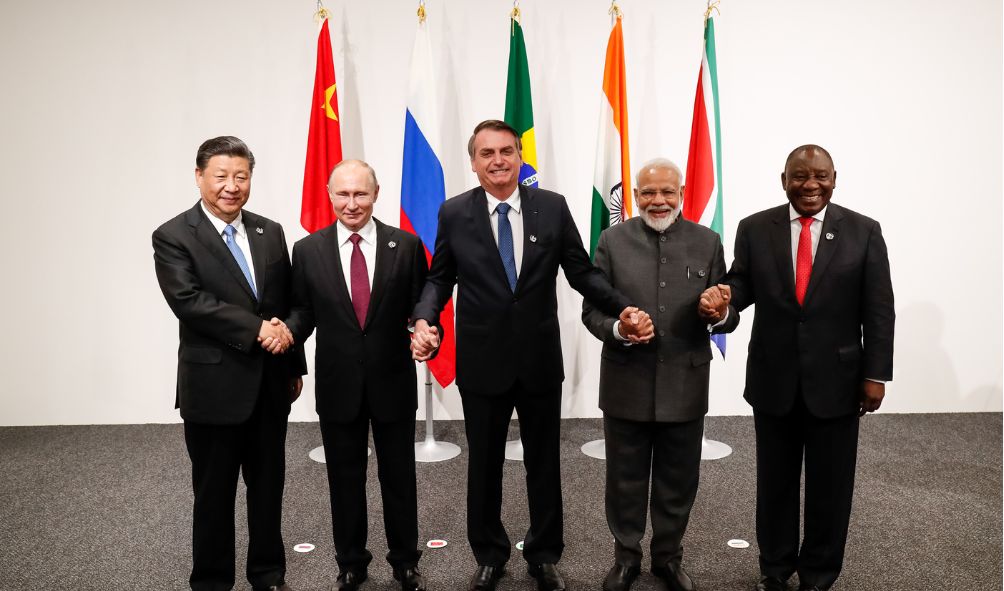Russia and China seeking to drive their Agenda in Africa during BRICS Summit

Russia and China hope to end Western dominance in Africa as they seek to drive their political and economic agenda during BRICS Summit
Russia and China hope to end Western dominance in Africa as they seek to drive their political and economic agenda during BRICS Summit.
Leaders from the BRICS economic bloc of Brazil, Russia, India, China, and South Africa will hold three days of meetings in Sandton, Johannesburg’s financial district, with the presence of Chinese Premier Xi Jinping highlighting the diplomatic capital his country has invested in the bloc over the last decade and a half as a vehicle for its ambitions.
As a result of a warrant issued by the International Criminal Court for his arrest about the conflict in Ukraine, Russian President Vladimir Putin’s travel to South Africa has been complicated.
Xi will be joined at the summit by Brazilian President Luiz Inácio Lula da Silva, Indian Prime Minister Narendra Modi, and South African President Cyril Ramaphosa.
The main summit on Wednesday, as well as the side meetings on Tuesday and Thursday, are anticipated to produce general demands for greater cooperation among countries in the Global South in light of their growing discontent with what they perceive to be Western dominance of global institutions.
Russia and China are more than glad to embrace this viewpoint.
To give Xi and Russian Foreign Minister Sergey Lavrov, who will represent Putin in South Africa, a sizable audience, leaders or representatives of dozens more developing nations are expected to attend peripheral meetings in Africa’s wealthiest city.
The proposed expansion of the BRICS bloc, which was established in 2009 by the emergent market nations of Brazil, Russia, India, and China, with the addition of South Africa the following year, will be discussed and possibly decided upon.
Saudi Arabia is among the more than 20 nations that have formally applied to join BRICS, according to South African officials.
Any move toward including the world’s second-largest oil producer in an economic bloc with Russia and China would undoubtedly attract the attention of the United States and its allies in a geopolitically frosty environment and in the wake of a recent Chinese initiative to exert influence in the Persian Gulf.
“If Saudi Arabia were to join BRICS, it would give this organization extraordinary significance,” said Talmiz Ahmad, India’s former ambassador to Saudi Arabia.
Analysts say that even an agreement on the principle of expanding BRICS, which already includes a significant portion of the developing world’s largest economies, would be a moral victory for the Russian and Chinese vision of the bloc as a counterbalance to the G-7.
Amid China’s economic friction with the U.S. and Russia’s Cold War-like impasse with the West over the war in Ukraine, both China and Russia favor adding more countries to bolster a coalition, even if it is only symbolic.
In addition to the Saudis, nations ranging from Argentina to Algeria, Egypt, Iran, Indonesia, and the United Arab Emirates have formally applied to join and are potential new members.
Prof. Alexis Habiyaremye of the College of Business and Economics at the University of Johannesburg explains that if a number of them are integrated, “then you end up with a larger economic bloc and a sense of power.”
Kenya and Indonesia signs FOUR deals as Ruto grants Ruto grants Indonesians free-Visa entry
Kalonzo ‘fails’ to attend bipartisan talks just a day after ‘advised’ to quit
KRA to use computer wizards to uncover tax fraud
Judiciary breaks silence over eviction of elderly in Lavington as DCI defends the arrest
IMF ‘forces’ Kenya to ditch gulf fuel import plan
While Brazil, India, and South Africa are less enthusiastic about expansion and seeing their influence diluted in what is presently an exclusive club for developing nations, momentum is building for it.
However, nothing has been decided, and the five countries must first concur on the membership requirements for new members. This is on the agenda in Johannesburg in response to Beijing’s efforts.
Chen Xiaodong, China’s ambassador to South Africa, stated that the expansion of the BRICS is currently the most popular topic. “Expansion is essential to enhancing the vitality of the BRICS mechanism. I believe this year’s summit will mark a significant new development on this front.”
To counteract any outsized Russian and Chinese influence emanating from BRICS, the U.S. has strengthened its bilateral ties with South Africa, Brazil, and India.
In the lead-up to the summit, the State Department stated that the United States was “deeply engaged with many of the leading members of the BRICS association.”
The European Union will also closely monitor events in Johannesburg, but with an almost exclusive focus on the war in Ukraine and the bloc’s continued, largely unsuccessful efforts to garner united condemnation for Russia’s invasion from the developing world.
Also read,
Preferred Raila successor; Oburu Odinga
“COMPLETELY UNACCEPTABLE!” ECOWAS rejects Niger Junta THREE-year transition plan
UK announces workers shortage calling for mass application while promising VISA; qualifications
TSC calls teachers’ unions to review salary increase
Follow us




